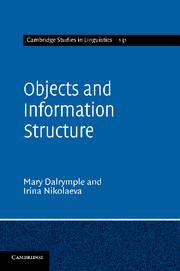Book contents
- Frontmatter
- Contents
- Preface and Acknowledgements
- List of Abbreviations
- 1 Introduction
- 2 Syntactic assumptions
- 3 Information structure in grammar
- 4 Syntax and information structure
- 5 Topicality and grammatical marking
- 6 Topical marking of nonsubjects
- 7 Topicality and DOM
- 8 Primary and secondary objecthood and DOM
- 9 Multiple objects and grammatical alignment
- 10 Semantic features, topicality and grammaticalisation
- 11 Conclusion
- References
- Author Index
- Language Index
- Subject Index
- References
References
Published online by Cambridge University Press: 05 October 2012
- Frontmatter
- Contents
- Preface and Acknowledgements
- List of Abbreviations
- 1 Introduction
- 2 Syntactic assumptions
- 3 Information structure in grammar
- 4 Syntax and information structure
- 5 Topicality and grammatical marking
- 6 Topical marking of nonsubjects
- 7 Topicality and DOM
- 8 Primary and secondary objecthood and DOM
- 9 Multiple objects and grammatical alignment
- 10 Semantic features, topicality and grammaticalisation
- 11 Conclusion
- References
- Author Index
- Language Index
- Subject Index
- References
Summary

- Type
- Chapter
- Information
- Objects and Information Structure , pp. 223 - 239Publisher: Cambridge University PressPrint publication year: 2011

